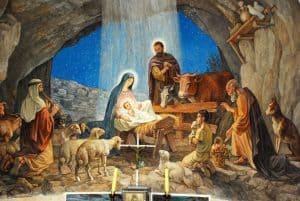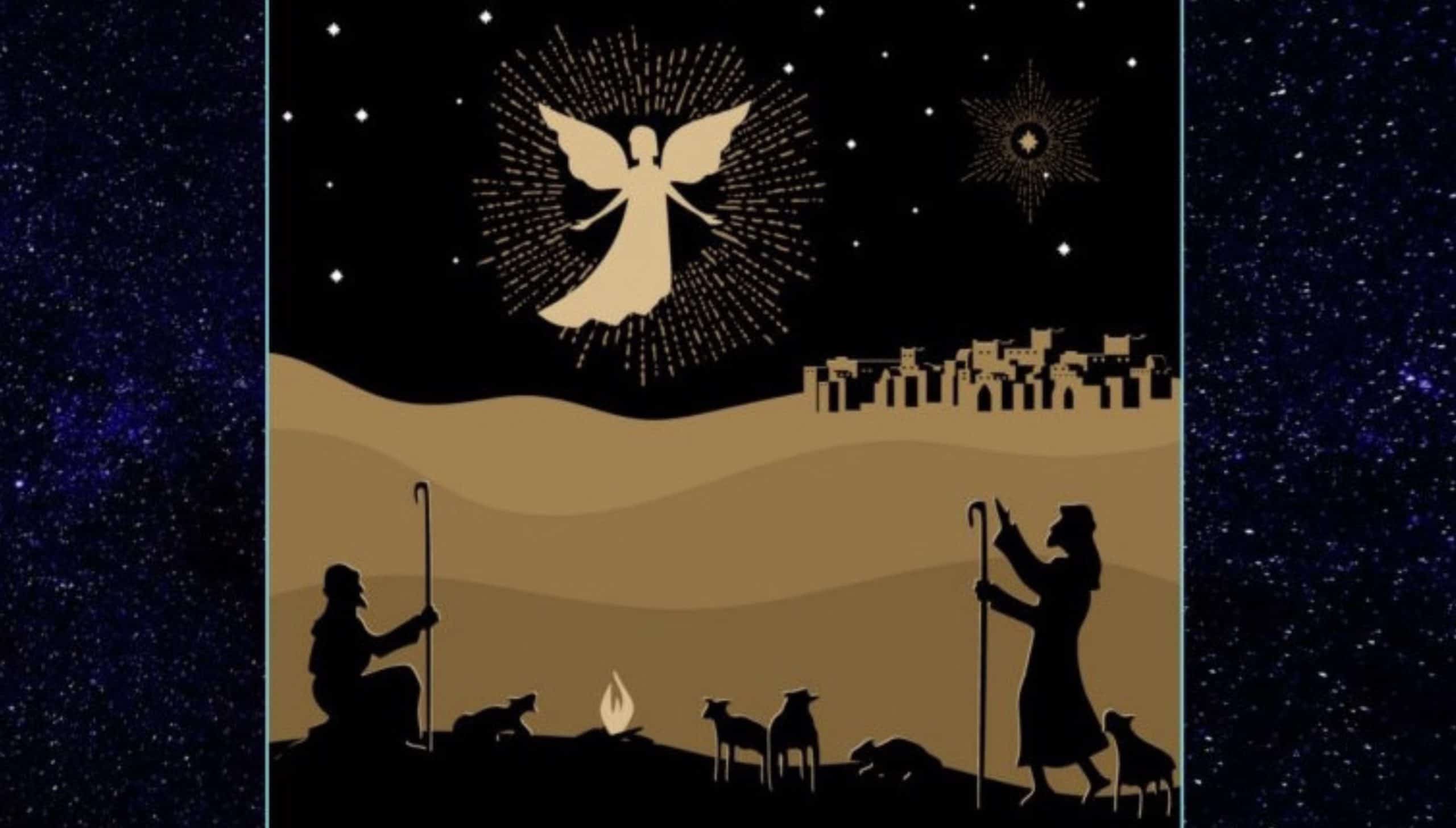Photographer Ben White, who took the photo of the nativity scene credited to him in this article.
Key point: We marvel at the arrival of Jesus as a baby in Bethlehem, and rightly so. Still, this response, as appropriate as it is, is just the beginning. The life and ministry of the Savior, including His substitutionary death and His victorious resurrection, leave us awed and overcome time and time again. The wonder of Christmas isn’t about Christmas only, but about Jesus Himself and His sacrificial love!
On the evening immediately following Jesus’ birth,
Luke 2:8there were in the same country shepherds abiding in the field, keeping watch over their flock by night.
9 And, lo, the angel of the Lord came upon them, and the glory of the Lord shone round about them: and they were sore afraid.
10 And the angel said unto them, Fear not: for, behold, I bring you good tidings of great joy, which shall be to all people.
11 For unto you is born this day in the city of David a Saviour, which is Christ the Lord.
12 And this shall be a sign unto you; Ye shall find the babe wrapped in swaddling clothes, lying in a manger.
13 And suddenly there was with the angel a multitude of the heavenly host praising God, and saying,
14 Glory to God in the highest, and on earth peace, good will toward men.
15 And it came to pass, as the angels were gone away from them into heaven, the shepherds said one to another, Let us now go even unto Bethlehem, and see this thing which is come to pass, which the Lord hath made known unto us.

16 And they came with haste, and found Mary, and Joseph, and the babe lying in a manger.
17 And when they had seen it, they made known abroad the saying which was told them concerning this child.
18 And all they that heard it wondered at those things which were told them by the shepherds.
19 But Mary kept all these things, and pondered them in her heart.
20 And the shepherds returned, glorifying and praising God for all the things that they had heard and seen, as it was told unto them.
Transformative Encounters
In a special sermon he included in a collection of sermons he titled No Little People (first published in 1974), Francis Schaeffer discussed how thoroughly the shepherds’ visit to Bethlehem on the night of the first Christmas must have transformed them. They had encountered the Son of God! Although an infant, He nevertheless was fully God, now come fully in the flesh as a human being. Schaeffer asks and answers some very penetrating questions.
Why did God come into this world? Only the scriptural answer will suffice: the second person of the Trinity has been born because He loves the world.

But why did He come this way, as a little baby? Why did He choose to lie in a manger and be cared for by a human mother, with the sweetness but the utter weakness of a newborn babe? He came this way because He came to meet the central need of men. He did not come to overthrow the Romans, though a lot of the Jews would have loved that. If He had, He would have come riding on a great conquering steed. The central reason He came was not to raise the living standards of the world. Surely if twentieth-century man were going to vote on the way he would like a messiah to appear, he would want Him loaded down with moneybags from Heaven. He did not come primarily to teach and relieve ignorance—perhaps then He would have come laden with books. An angel had revealed to Joseph the primary task for which He came: “Thou shalt call his name JESUS; for he shall save his people from their sins” (Matt:1:21).
How is Jesus going to fulfill this promise? The fulfillment cannot be separated from Calvary’s cross—from the nails, the hammer, the harshness of such a death. Jesus as the Passover Lamb will complete the promise the Jews affirmed in the Passover for 1,500 years. He is going to save His people by His act of Passover obedience.
When we perceive the simplicity and yet the grandeur of what is involved, we are overwhelmed.
—Francis Schaeffer—
When we perceive the simplicity and yet the grandeur of what is involved, we are overwhelmed. The second person of the Trinity lies in the manger for a reason. Because He loves the world, He has come not just to eliminate the peripheral results of man’s fall (though these will be totally removed at His second coming); He is here to cut the nerve of man’s real dilemma, to solve the problem from which all other problems flow. The “condition of man” is not what modern man thinks it is. Man is a sinner who needs an overwhelming love. Jesus has come to save His people from their sins. This is not to say that He has no interest in these other things now, but we must not get the matters reversed—the central thing is central.1
The “condition of man” is not what modern man thinks it is.
—Francis Schaeffer—
The Shepherds Knew Enough to Marvel, and so Did Those With Whom They Shared Their News
While the shepherds could not have understood all God intended to do in sending His Son, they clearly understood enough to be captivated by what they did comprehend, and so did the people with whom these sheepherders shared what they had seen and heard. As Luke 2:17-18 tells us, “17And when they had seen it, they made known abroad the saying which was told them concerning this child. 18And all they that heard it wondered at those things which were told them by the shepherds.”
The Greek word translated wondered in verse 18 means means “marveled.” It is along these very lines that Francis Schaeffer observed, “When we perceive the simplicity and yet the grandeur of what is involved, we are overwhelmed.” Indeed, to even begin to fathom what God was up to in sending Jesus into the world necessarily means that we marvel. How can we do otherwise?
People Marveled at Jesus Throughout His Ministry
The Gospels — Matthew, Mark, Luke, and John — indicate there were many instances in which people marveled2 over Jesus. I cite twenty-one such instances below, along with the broader context of each so readers can get a clear picture of why the people who saw, heard, and otherwise encountered Jesus responded as they did. In each of these instances, the Gospel writer involved used the same word translated wondered in Luke 2:18. This is the first passage on our list. These incidents are arranged in the order in which they likely occurred.3

-
-
- Luke 2:16-18; 2:8-20; The shepherds shared their experiences, and those who heard them marveled.
- Luke 2:33; 2:25-35; At the temple, Mary and Joseph marveled at Simeon’s words concerning Jesus, who was just a few weeks old at the time.
- John 4:27; 4:1-30,39-42; Jesus’ disciples marveled that their master spoke directly with a woman (not to mention a Samaritan). This went against the rabbinic and cultural teachings and practices of that day.
- Luke 4:22; 4:14-30; The people who heard Jesus at the synagogue in Nazareth marveled, or wondered, at His words, even though they rejected Him.
- Matthew 9:8; 9:1-8; See Mark’s and Luke’s reports of this incident here. The people who saw Jesus forgive a paralytic marveled at the proof He offered that He had authority to forgive sins and therefore was God. He healed the man, who immediately arose and left to go home.
- John 5:20; 5:16-23; Jesus declared to the Jews who opposed Him, “Verily, verily, I say unto you, The Son can do nothing of himself, but what he seeth the Father do: for what things soever he doeth, these also doeth the Son likewise. For the Father loveth the Son, and sheweth him all things that himself doeth: and he will shew him greater works than these, that ye may marvel” (John 5:19-20).
- Matthew 8:27 and Luke 8:25; Matthew 8:23-27 and Luke 8:22-25; Read Mark’s account of this incident here. The winds and the waves obeyed Jesus, and the disciples were awestruck.
- Mark 5:20; 5:1-20 — Read Matthew’s and Luke’s accounts of this incident here. When a formerly demon-possessed man whom Jesus had healed shared his story of positive change with those in Decapolis (the Ten Towns), they were filled with wonder.
- Matthew 9:33; 9:27-34; “The multitudes marvelled” after Jesus, who had just healed two blind men, also healed a demon-possessed man who couldn’t speak. Even the Pharisees reacted, saying Jesus “casteth out devils through the prince of the devils.”
- Mark 6:51; 6:45-51; Read Matthew’s and John’s accounts of this incident here. Jesus walked on the sea in the midst of a violent wind to His disciples and entered their boat. When he stepped inside, the wind became calm. The disciples were amazed, and they marveled.
- Matthew 15:31; 15:29-31; Jesus healed many, and those who witnessed these miracles wondered, or marveled.
- Luke 9:43; 9:37-45; Read Matthew’s and Mark’s accounts of this incident here. After Jesus healed a boy His disciples had been unable to, everyone was marveling “at all things which Jesus did.” Remarkably, Jesus used this occasion to tell His disciples that “the Son of man shall be delivered into the hands of men.”
- John 7:15,21; 7:10-21; Jesus’ Jewish opponents marveled at His wisdom, despite the fact He had no formal education. In verse 21, Jesus told those who had accused Him of having a devil, “I have done one work, and ye all marvel.”
- Luke 11:14; 11:14-23; After Jesus cast a demon out of a mute man and enabled him to speak, the people marveled.
- Luke 11:38; 11:37-54; The Pharisees marveled that Jesus did not practice a Jewish handwashing ceremony before eating.
- Matthew 21:20; 21:18-22; Read Mark’s account of this incident here. Jesus commanded a fruitless fig tree to wither. When His disciples saw the shriveled tree afterward, they marveled.
- Matthew 22:22, Mark 12:17, and Luke 20:25-26; Matthew 22:15-22, Mark 12:13-17, and Luke 20:20-26; The Pharisees who sought to trap Jesus couldn’t outsmart Him, and the people, including the Pharisees, marveled at Jesus’ response to their question.
- Matthew 27:14 and Mark 15:5; Matthew 27:11-14 and Mark 15:1-5; At Jesus’ trial, Pilate marveled at Jesus’ silence.
- Mark 15:44; 15:42-47; Pilate marveled that Jesus, who had been crucified, already had died.
- Luke 24:12; 24:1-12; After Jesus’ resurrection, Peter saw the tomb that no longer held Jesus’ body After Jesus’ resurrection, and he marveled., or was “wondering in himself at that which was come to pass.”
- Luke 24:41; 24:36-43; In a post-resurrection appearance to His disciples, Jesus showed His closest followers His hands and His feet. The disciples marveled when He said, “Behold my hands and my feet, that it is I myself: handle me, and see; for a spirit hath not flesh and bones, as ye see me have.”
-
God’s Plan Was and Is Marvelous!
Notice that Jesus’ friends and foes alike marveled at what they witnessed Jesus say and do. Also notice that the response of the people who heard what the shepherds tell them about what happened on the evening of the day Jesus was born foreshadowed the responses of multitudes to the Savior. We are reminded of Matthew 21:42 and Mark 12:11, where Jesus quoted from Psalm 118. Psalm 118:22-23 declares,
22 The stone which the builders refused is become the head stone of the corner.
23 This is the Lord‘s doing; it is marvellous in our eyes.
Here is the broader context for Matthew’s and Mark’s accounts of Jesus’ quoting from Psalm 118. Significantly, in both Matthew 21:42 and Mark 12:11, the word rendered “marvellous” is a form of the Greek word translated “marveled” or “wondered.” This word appears in all of the above passages relating events from Jesus’ ministry.

The wonder of Christmas, therefore, isn’t just about the shepherds’ report of their experiences that first Christmas night — not by a long shot. It’s about everything Jesus came to do. More importantly, it’s about who He is.
The most important thing He came to accomplish, of course, is paving the way for divine forgiveness and salvation for sinful humanity. Only He, the perfect Son of God, could do this. Moreover, God’s plan of salvation could have originated only with Him; it never could have had its genesis in any human mind or imagination. This is another reason we marvel. God’s plan is reasonable in that it makes sense, but it is so preposterous it blows our minds completely!

Perhaps this is why Paul wrote,
Thanks be unto God for his unspeakable gift.
O the depth of the riches both of the wisdom and knowledge of God! how unsearchable are his judgments, and his ways past finding out!
For who hath known the mind of the Lord? or who hath been his counsellor? [Here Paul quoted Isaiah 40:13.]
Or who hath first given to him, and it shall be recompensed unto him again? [Here the apostle quoted from Job 41:11.]
For of him, and through him, and to him, are all things: to whom be glory for ever. Amen.
Remember what Francis Schaeffer said: “The ‘condition of man’ is not what modern man thinks it is. Man is a sinner who needs an overwhelming love…[and] Jesus has come to save His people from their sins.”
No wonder we marvel!
Copyright © 2020 by B. Nathaniel Sullivan. All rights reserved.
Unless otherwise indicated, Scripture has been taken from the King James Version of the Holy Bible.
An edition of this article using the New King James Version is available here.
To explore more Word Foundations Christmas posts, go here.
Notes:
2Francis Schaeffer, “What Difference Has Looking Made? (A Christmas Study)” No Little People, in The Complete Works of Francis A. Schaeffer, Vol. 3: A Christian View of Spirituality, (Westchester, IL: Crossway Books, 1982) 123-124.
2Unless I’m quoting the KJV directly, I’m spelling marveled with one “l” in this article, since this is the American spelling. The KJV spells it with 2 “l”s.
3Steven L. Cox and Kendell H. Easley, Harmony of the Gospels (using the Holman Christian Standard Bible), (Nashville: Holman, 2007). This volume relies on A. T. Robertson’s 1922 edition of Harmony of the Gospels.
top image credit: Lightstock
image credit: Christ and the Samaritan Woman
